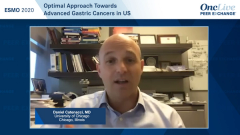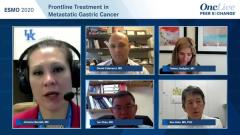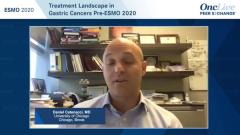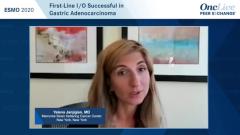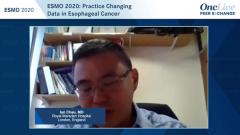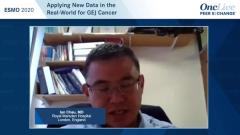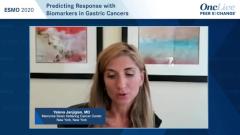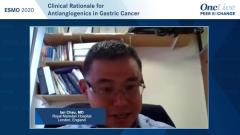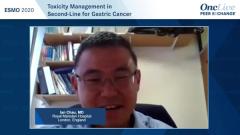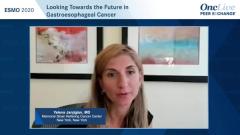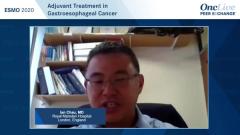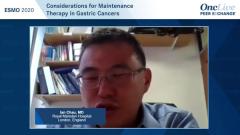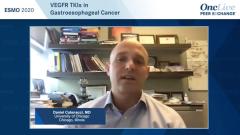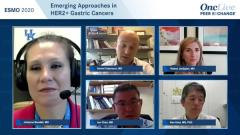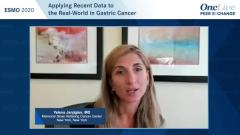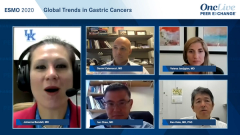
Adjuvant Treatment in Gastroesophageal Cancer
Episodes in this series

Transcript:
Johanna Bendell, MD: We have these great data now bringing checkpoint inhibitors earlier into the lines of therapy, particularly for patients with esophageal cancer. Now to throw another fly in the ointment, let’s talk a little bit about the CheckMate-577 study [NCT02743494] we also saw at ESMO [the European Society for Medical Oncology meeting] yesterday. Ian, can you tell us what was the CheckMate-577 study, and how is that going to potentially impact what we do?
Ian Chau, MD: CheckMate-577 is a large phase 3 randomized study, which is being done globally, so about a third in Europe, a third in North America, and then a third in Asia and the rest of the world. Again, it’s a global study. In this study, patients would have undergone preoperative chemoradiation and then underwent surgery. Those who still had a residual tumor, those who have not achieved a pathological complete response [path CR] and had an R0 resection, were randomized to adjuvant nivolumab or placebo. The standard of care after preoperative chemoradiation is just observation. Usually we don’t give any further treatment afterward. This study randomized between nivolumab and placebo, and 794 patients were randomized in a 2:1 fashion. The primary end point in this study is disease-free survival [DFS], and a secondary end point is overall survival.
What we have heard is the primary end point was met, ie, there was a significant improvement in disease-free survival in favor of nivolumab. At the median level, there was an 11-month advantage of nivolumab over placebo. The median DFS was 22.4 months in the nivolumab arm and only 11 months in the placebo arm.
Now, in this study, again because it’s esophageal, they actually have both squamous cell cancer as well as adenocarcinoma in this study, although the majority was adenocarcinoma. Only about 30% or maybe just under 30% of the patients had squamous cell cancer. I think that probably is another interesting discussion point in this study. We heard earlier on, Dan said in the advanced disease setting, we think that squamous cell really benefits from checkpoint inhibitors. Here we have a study where the majority had adenocarcinoma, but they seem to benefit.
The important thing to me from this study is knowing that even in a so-called curative setting, after preoperative chemoradiation, after surgery, there are so many patients who relapsed, even within the first 12 months. If you take away all the path CR patients, there are so many people who relapse so quickly, and I think that is an important observation. But now we have nivolumab, which improved things; that would certainly be a great contribution.
Now I suppose one of the other main criticisms, and I’m interested to hear what Ken, and Dan, and Yelena said, is all the studies in preoperative treatment for esophageal gastric cancer, use overall survival as the primary end point. Are we happy enough to use disease-free survival as a practice-changing end point? Certainly, it’s a very convincing disease-free survival advantage. I don’t think the follow-up is enough for them to analyze for overall survival yet. We may still wait and see that. That might still come, so we’ll see.
Johanna Bendell, MD: Let’s say we’re using nivolumab now as adjuvant therapy for these patients with esophageal cancer. What happens when they recur? Would you consider bringing a checkpoint inhibitor therapy with combination chemotherapy still as standard first-line therapy, or would you make sure that there’s a certain amount of time between the completion of nivolumab and recurrence? How would you address now what you do in the metastatic setting with these patients, if these patients recur? Ken, what are your thoughts there?
Ken Kato, MD, PhD: For such patients, we consider that patient’s disease is refractory to the immune checkpoint inhibitor. There are no data that say to reintroduce the immune checkpoint inhibitor, so there’s still a challenging problem. There are some data from melanoma or lung cancer for the rechallenging of immune therapy for the metastatic setting, but there are no data for gastric cancer.
Johanna Bendell, MD: Yes, operating in a data-free zone, which as we get so many trials that keep coming so quickly, we end up getting stuck in that zone. Is there anybody here who would consider using a checkpoint inhibitor after progression in the adjuvant setting, or would you want a time break? Again, it’s a data-free zone, so everybody’s answer is right.
Yelena Janjigian, MD: Johanna, if I may comment; in short, we don’t know, and typically for cytotoxic therapy, we use the 6 months as the magic cutoff. In other words, if the patient recurred greater than 6 months after the stop of therapy, perhaps use of platinum or other agents may be considered. Immune checkpoint inhibitors, there’s still a lot to be learned. Perhaps if there was a long enough interval since the discontinuation of adjuvant therapy, a rechallenge with a combination of chemotherapy plus immune checkpoint inhibitor, as opposed to immune checkpoint inhibitor monotherapy, could be considered.
I wanted to make a separate point about the standard of care in the United States and most of the world. Again, for esophagus and GE [gastroesophageal] junction tumors, for Siewert type 1 and 2, preoperative chemoradiation and preoperative therapies really stay the mainstay. There are several important studies that are underway looking at neoadjuvant chemotherapy or combination with immunotherapy. Yes, it was very satisfying to see the adjuvant data with nivolumab, and this is the first of its kind in the GI [gastrointestinal] and upper GI setting. It will add to the body of literature in this setting. If the neoadjuvant studies, however, read out to be positive, fingers crossed, that will be the big question, when will immune checkpoint inhibitors be used? The majority of us, again because of all the challenges of getting adjuvant therapy to patients, after 3 months of chemoradiation and then surgery, they just want to be done with therapy. It’s likely that neoadjuvant therapy will replace the adjuvant therapy if the data hold up.
Transcript Edited for Clarity


